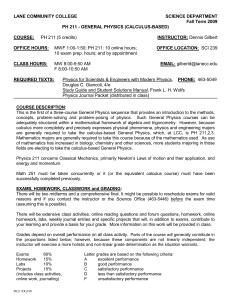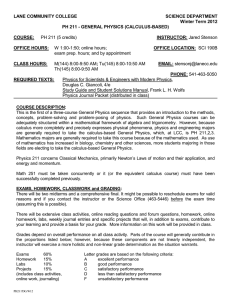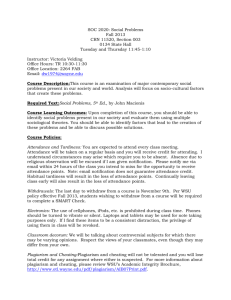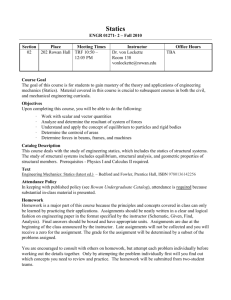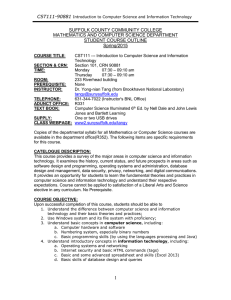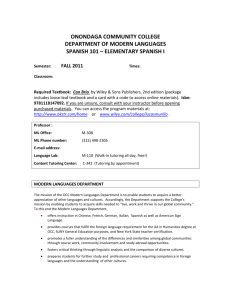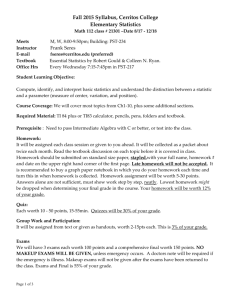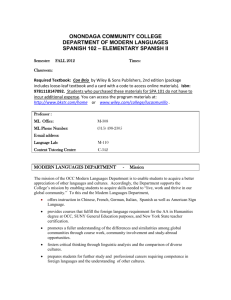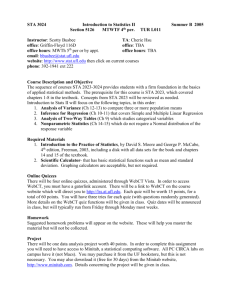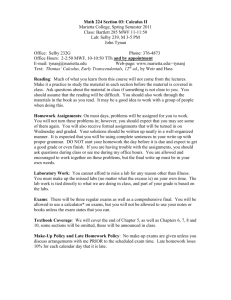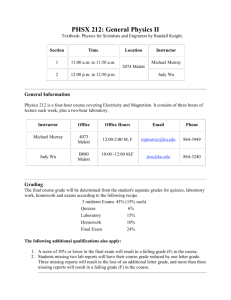Master Course Syllabus - Passaic County Community College
advertisement
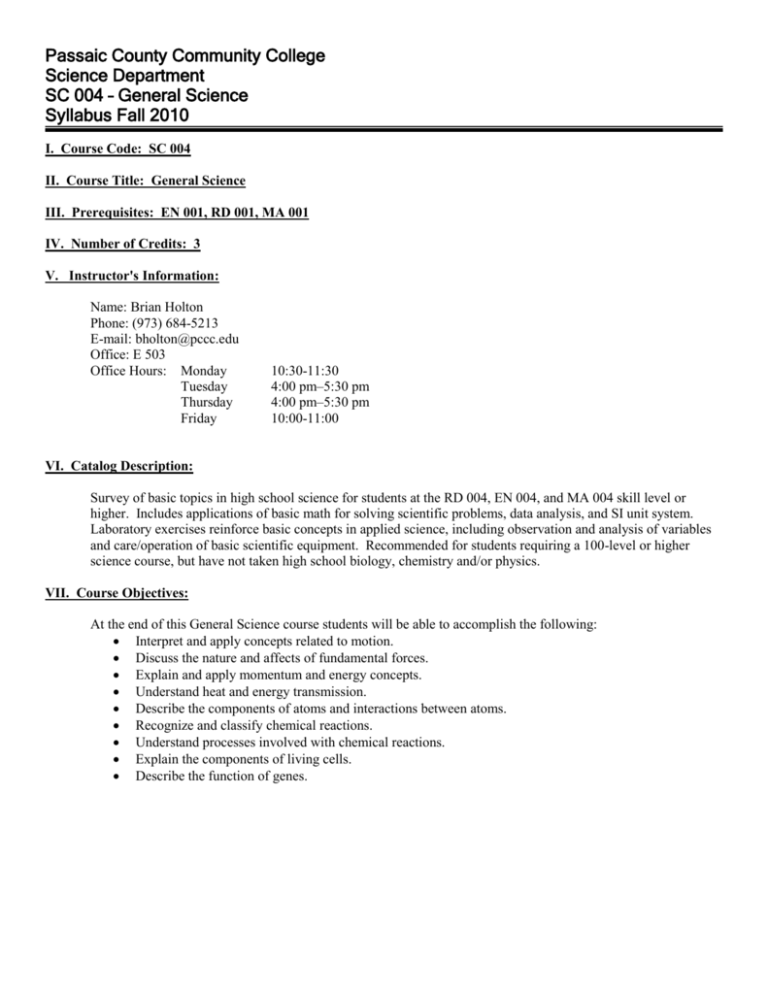
Passaic County Community College Science Department SC 004 – General Science Syllabus Fall 2010 I. Course Code: SC 004 II. Course Title: General Science III. Prerequisites: EN 001, RD 001, MA 001 IV. Number of Credits: 3 V. Instructor's Information: Name: Brian Holton Phone: (973) 684-5213 E-mail: bholton@pccc.edu Office: E 503 Office Hours: Monday Tuesday Thursday Friday 10:30-11:30 4:00 pm–5:30 pm 4:00 pm–5:30 pm 10:00-11:00 VI. Catalog Description: Survey of basic topics in high school science for students at the RD 004, EN 004, and MA 004 skill level or higher. Includes applications of basic math for solving scientific problems, data analysis, and SI unit system. Laboratory exercises reinforce basic concepts in applied science, including observation and analysis of variables and care/operation of basic scientific equipment. Recommended for students requiring a 100-level or higher science course, but have not taken high school biology, chemistry and/or physics. VII. Course Objectives: At the end of this General Science course students will be able to accomplish the following: Interpret and apply concepts related to motion. Discuss the nature and affects of fundamental forces. Explain and apply momentum and energy concepts. Understand heat and energy transmission. Describe the components of atoms and interactions between atoms. Recognize and classify chemical reactions. Understand processes involved with chemical reactions. Explain the components of living cells. Describe the function of genes. VIII. Course Outline: Week Class 1 1 2 2 3 3 4 5 6 4 7 5 8 9 10 6 11 12 7 13 14 8 15 9 16 17 18 10 19 20 11 21 22 12 23 24 13 25 26 14 27 15 28 29 Topics The Scientific Method The Natural Sciences Mass, Inertia, Weight, Density Force, Equilibrium, Friction Speed, Velocity Acceleration Newton’s First Law Newton’s Second Law Newton’s Third Law Momentum, Impulse Conservation of Momentum, Collisions Energy, Work, Power Potential Energy, Kinetic Energy, Conservation of Energy Newton’s Law of Gravity, Inverse Square Law Weight and Weightlessness Projectile Motion, Satellite Orbits Exam 1 Temperature, Temperature Scales, Heat Laws of Thermodynamics Heat Capacity, Expansion Conduction, Convection, Radiation Charge, Electric Force, Conductors, Insulators Voltage Sources, Current, Circuits Magnetic Force, Fields, Domains Electromagnetic Induction Elements, Atoms Protons, Neutrons, Isotopes Atomic Spectra Electron Waves, Atomic Orbitals Chemistry, Phases of Matter, Phase Changes Physical and Chemical Properties Periodic Table, Compounds Electron Shells Ionic, Metallic, and Covalent Bonds Exam 2 Polar Bonds, Interparticle Attractions Solutions, Solubility Chemical Reactions, Chemical Equations Acid-Base Reactions, Salts Acids, Bases, The pH Scale Oxidation-Reduction Reactions Corrosion and Combustion, Reaction Rates Endothermic, Exothermic, Entropy Life, Cell Types, Prokaryotic, Eukaryotic Cell Membrane, Transport Mechanisms Cell Communication, Reproduction, Energy Use Photosynthesis, Respiration, Life Span Genes, Chromosomes, DNA Replication Transcription, Translation, Meiosis Genetics, Inheritance, Human Genome Genetic Mutations, Cancer Exam 3 Textbook Reading Chapter 1, Sections 1–11 Chapter 2, Sections 1–8 Chapter 2, Sections 9, 10 Chapter 3, Sections 1, 2 Chapter 3, Sections 3, 4, 6 Chapter 4, Sections 1–4 Chapter 4, Sections 5, 6, 8, 10 Chapter 5, Sections 1–4, 6 Chapter 5, Sections 7–12 Chapter 6, Sections 1–5 Chapter 6, Sections 6–10 Chapter 7, Sections 1, 5, 6, 7, 10 Chapter 7, Sections 12–15 Chapter 9, Sections 1–4 Chapter 9, Sections 5–8 Chapter 11, Sections 1–4 Chapter 11, Sections 5–9 Chapter 12, Sections 1–4 Chapter 12, Sections 5–6 Chapter 13, Sections 1–3 Chapter 13, Sections 4–6 Chapter 13, Sections 7–10 Chapter 15, Sections 1–5 Chapter 15, Sections 6–11 Chapter 16, Sections 1–5 Chapter 16, Sections 6–10 IX. Required Texts and Materials: Textbook: Conceptual Integrated Science by Hewitt, Lyons, Suchocki, and Yeh Addison-Wesley, 1st Edition, ISBN: 0805390383 X. Methods of Evaluation: Homework: Homework will be assigned and graded. It is due the next class after it is assigned. Since your understanding of the material depends on out of class preparation, late homework is frowned upon. Lab Attendance: Attendance of lab is compulsory and will count toward your class grade. Lab Reports: During each lab you will write answers to questions posed in lab worksheets. Your answers must be written into a notebook that you bring to lab each week. Make sure your answers are thorough and that you include any associated graphs and tables in your notes. Your lab report will be graded near the end of the lab period. Lab Quizzes: During the first ten minutes of each lab you will be given a short quiz about the material covered in the previous lab period. This is an open-notes quiz. You may use your notes from the previous lab to help you answer the questions. If you are late for the lab period and miss the quiz time you will be given a grade of zero for the quiz. Exams: Three exams will be given for this course as indicated in the Course Outline. All exams carry the same weight in counting toward your grade. Make-up Work: There will be no make-up work for missing homework or lab quizzes. Make-ups for exams may be given if you consult the instructor prior to missing the exam. Your class grade will be based on the following components in the proportions indicated: Homework Lab Attendance Lab Reports Lab Quizzes Exams (3) 20% 5% 5% 10% 60% (20% each) Grade Scale: Grade A A- B+ B B- C+ C D F Breakpoint (%) 90 86 82 78 74 70 62 50 Below 50 Expectations: Attendance of class is not a part of your grade but class attendance is mandatory. You must inform the instructor of any planned absences at least one day prior to your absence. If you do miss class, it is your responsibility to obtain any work that was missed from a colleague. You are expected to have the required textbook reading completed prior to attending each class. You are encouraged to see the instructor during office hours when you have difficulties understanding the material covered during the course. Students that require any special educational needs must notify the instructor and show the requisite documentation prior to the end of the second week of class. Academic Conduct: You must abide by the rules listed in the Passaic County Community College Academic Bulletin Student Code of Conduct with regards to academic dishonesty and plagiarism. The Passaic County Community College Academic Bulletin Student Code of Conduct policies on your rights and responsibilities as a student all apply to this course. Make sure you have read and understand all those policies. All work you submit must be your own. Every instance of academic dishonesty and plagiarism will be dealt with as described in the Passaic County Community College Academic Bulletin Student Code of Conduct. I endorse group discussion of homework problems and lab work. If you do discuss problems with other students then credit them in the work that you submit by writing their names at the end of your work. Do not take this to mean that copying someone else’s work is allowed. If any part of your work looks very similar to that of another student then it will be considered plagiarism. Disabilities: If you have a disability and believe you need accommodations in my classroom, please see a counselor in the Center for Student Success. If you require testing accommodations, you must notify me at least one week in advance of the test.
